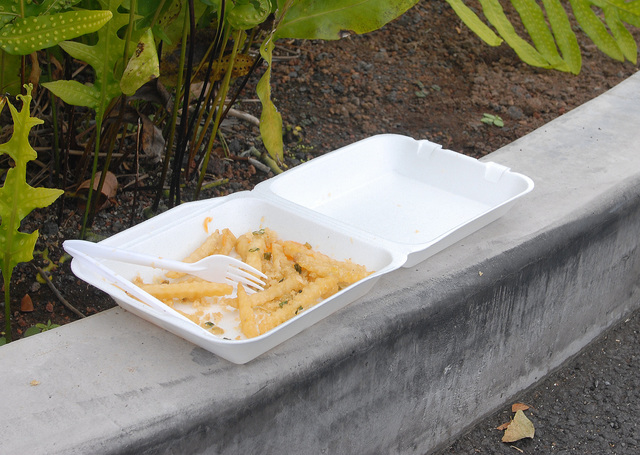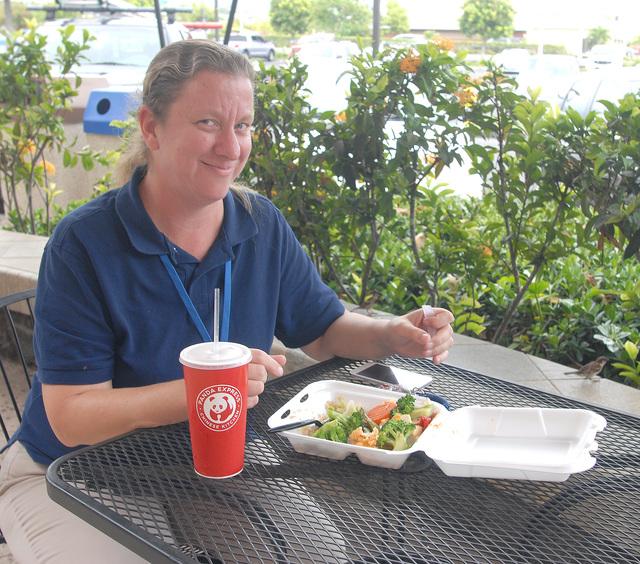HILO — One County Council member wants to study the use of so-called “Styrofoam” containers on the island, while another council member wants to ban them outright.
HILO — One County Council member wants to study the use of so-called “Styrofoam” containers on the island, while another council member wants to ban them outright.
The dueling bills will play out before the council’s Environmental Management Committee at 3 p.m. today at the West Hawaii Civic Center. The public can also view the meeting and testify by videoconference from Hilo council chambers, the Waimea council room, the Kamehameha Park conference room, the Naalehu state building and the Pahoa neighborhood facility.
Kohala Councilwoman Margaret Wille’s Bill 140 would ban polystyrene foam for take-out containers and plate lunches starting in 2018. Wille compares the initial resistance to the bill to the resistance some businesses and residents had for a plastic bag ban, which ultimately was implemented in smooth fashion.
“There is so much toxicity out there that we can’t do anything about,” Wille said. “This, we can. Let’s make a difference. Let’s be a model.”
Council members appeared deadlocked on the bill at a February Environmental Management Committee meeting.
Puna Councilman Greggor Ilagan’s Bill 204 would launch an education campaign tailored to businesses, nonprofit organizations and the general public. It requires the Department of Environmental Management to file an annual report to the council that includes a listing of food service establishments that currently do not use polystyrene foam disposable food service containers, a listing of food service establishments that have committed to making the transition away from the containers and an estimate of the number of containers sold and deposited in county landfills during the previous year.
“There are many restaurants in Puna that have already transitioned away from polystyrene containers, and we want to support and recognize them,” Ilagan said in a statement. “If we publish a list of restaurants that do not use polystyrene containers, people will know which restaurants are still using them, and that will bring market pressure on them to change.”
Environmental Management Director Bobby Jean Leithead Todd is stuck in the middle. She wasn’t ready Monday to endorse either bill.
She’s been working with Wille to amend Bill 140 banning polystyrene foam containers. Among the changes Leithead Todd suggested were delaying the effective date from Jan. 1, 2018, to July 1, 2018, to give the county time to get a new composting facility up and running, to require the use of compostable or recyclable food service ware and to clarify the ban doesn’t apply to items packaged outside the county or containers for raw meats or poultry.
Penalties from $100 to $1,000 have also been added to the bill, depending on the number of prior violations and how many people are being served at festivals and community events.
“I have not seen the final version,” she said, “but I think what we worked on is a better bill than was originally submitted.”
At the same time, Leithead Todd has reviewed Bill 204, introduced by Ilagan, and said there are issues with that bill as well. The main issue is the additional staffing and cost such a study would entail.
“It’s not a bad idea,” Leithead Todd said. “But for me, the whole question is, if you’re going to ask me to do something, are you going to fund it?”
Restaurateurs and food retailers stand by their use of polystyrene. It’s not just the cost, they said during testimony in February. It’s also the availability of suitable alternatives that keep food hot and don’t collapse under heat and moisture.
“Supermarkets and take-out restaurants are dependent on polystyrene for plate lunches and polystyrene meat trays,” said Derek Kurisu, executive vice president of KTA Super Stores and chairman of the statewide industry group Hawaii Food Industry. “We tried paper or recyclable trays in our deli but it doesn’t work like polystyrene.”




